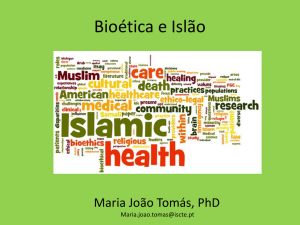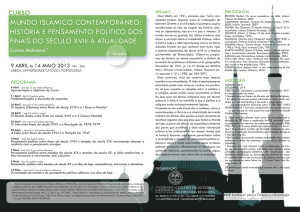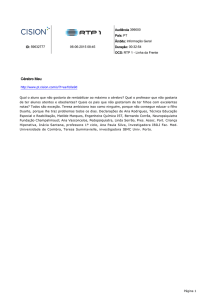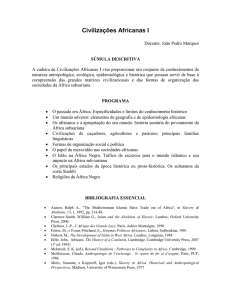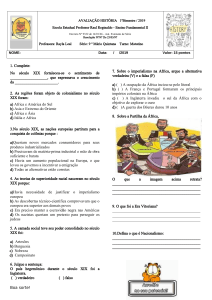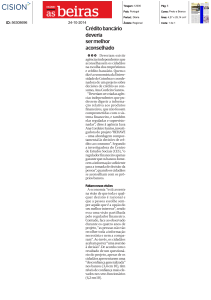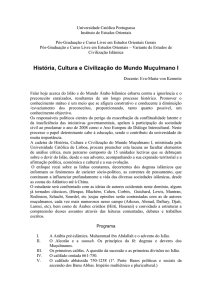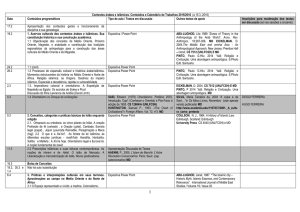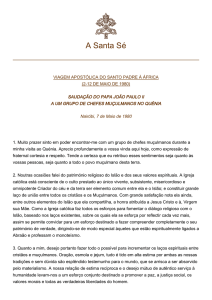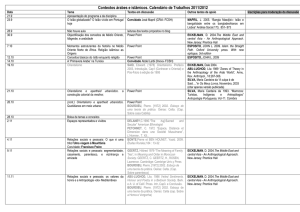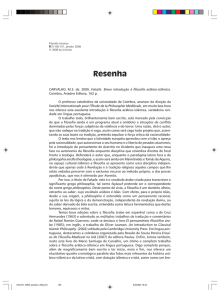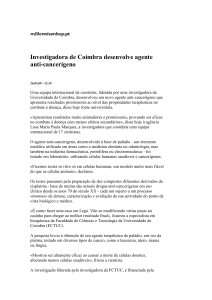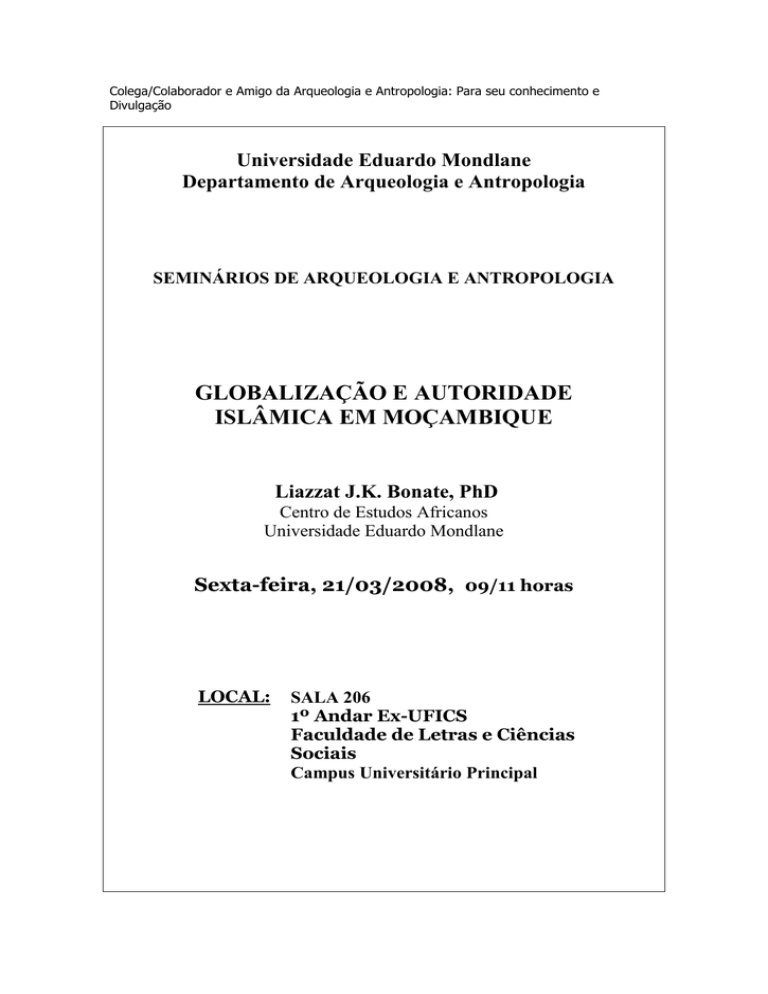
Colega/Colaborador e Amigo da Arqueologia e Antropologia: Para seu conhecimento e
Divulgação
Universidade Eduardo Mondlane
Departamento de Arqueologia e Antropologia
SEMINÁRIOS DE ARQUEOLOGIA E ANTROPOLOGIA
GLOBALIZAÇÃO E AUTORIDADE
ISLÂMICA EM MOÇAMBIQUE
Liazzat J.K. Bonate, PhD
Centro de Estudos Africanos
Universidade Eduardo Mondlane
Sexta-feira, 21/03/2008, 09/11 horas
LOCAL:
SALA 206
1º Andar Ex-UFICS
Faculdade de Letras e Ciências
Sociais
Campus Universitário Principal
Breve Informação biográfica
Liazzat J. K. Bonate
Docente e Investigadora
Centro de Estudos Africanos
Universidade Eduardo Mondlane
1. Contactos
Emails: [email protected]; [email protected].
2. Educação
PhD, Department of Historical Studies, Universidade de Cape Town, África do
Sul, 2007; tese: “Traditions and Transitions: Islam and Chiefship in Northern
Mozambique, ca. 1850-1974”;
MA História (especialização: História de África; minor: Antropologia
Sociocultural), Universiadde de Northwestern, EUA, 2002; tese: “The
Ascendance of Angoche: Politics of Kinship and Territory in Northern
Mozambique.”
MA em Sociedades e Culturas Islâmicas, com Mérito (especialização: As
Tendências Modernas no Islão; os minors: Direito Islâmico e Islão em África
Sub-Sahariana), School of Oriental and African Studies (SOAS), Universidade
de Londres, Reino Unido, 1998; tese: “Politicization of a Sufi Order: The
Khatmiyya of the Sudan.”
BA & MA História Universal, Universidade Estatal de Kasaquistão, Almaty, exURSS, 1990.
3. Experiência Profissional
Docente e Investigadora, Centro de Estudos Africanos, Universidade Eduardo
Mondlane, desde Outubro de 2007;
Docente de Departamento de História, Faculdade de Letras e Ciências Sociais,
Universidade Eduardo Mondlane, 1993 – Outubro, 2007;
Investigadora, “Islamic Education in Africa Research Project”, Universidade de
Bergen, Noruega e Universiadde de Cape Town, África do Sul, actualmente;
Investigadora, “Women’s Land Rights
Universidade de Emory, EUA, 1999-2000;
Investigadora, “Islamic Family Law and Human Rights Research Project”,
Centre of Islamic and Middle Eastern Laws (CIMEL), School of Oriental and
African Studies, Universidade de Londres, Reino Unido, 1998-99.
4. Publicações
in
Africa
Research
Project”,
1.
“Women’s Land Rights in Mozambique: Cultural, Legal and Social Contexts”.
In: Muthoni Wanyeki (ed.) Women and Land in Africa: Culture, Religion, and
Realizing Women’s Rights. London/New York/Cape Town: Zed Publishers,
2003, pp. 96-133.
2.
“The Ascendance of Angoche: Politics of Kinship and Territory in the
Nineteenth Century Northern Mozambique.” In Lusotopie, Paris: Ed. Karthala,
2003, No 1, pp. 115-143.
3.
“From Assirazi into Monhé: Angoche and the Mainland in the Context of the
Nineteenth Century Slave Trade in Northern Mozambique”. In B. Zimba, E. A.
Alpers, and A. Isaacman (eds.), Slave Routes and Oral Tradition in Southeastern
Africa. Maputo, 2005, pp. 195-219.
4.
“Dispute over Islamic Funeral Rites in Mozambique. A Demolidora dos
Prazeres by Shaykh Aminuddin Mohamad”. Le Fait Missionnaire, Lausanne,
No 17, 2005, pp. 41- 61
5.
“Matriliny, Islam and Gender in Northern Mozambique”. In Journal of Religion
in Africa. Leiden: Brill, 2006, No 36, Vol. 2, pp. 139-166.
6. “Roots of Diversity in Mozambican Islam.” Lusotopie, Leiden: Brill, 2007, Mai,
XIV (1), pp. 129-149.
7.
“Islam and Chiefship in Northern Mozambique”. ISIM Review, Centro de
Estudos do Islão no Mundo Moderno (ISIM), Universidades de
Amsterdam/Leiden/Nijmegen/Utrecht, 2007, No 19, pp. 57-57.
8.
“O Islão Negro: As Abordagens Coloniais do Islão no Norte de Moçambique.”
Revista do Religare, Universidade Federal da Paraíba, Brasil, Março, 2008.
9. “The Use of Arabic Script in Northern Mozambique.” Tydskrif vir Letterkunde,
Universidade de Pretória, 2008, No 45(1).
10. “Islamic Education in Mozambique.” Annual Review of Islam in South Africa
(ARISA), Universidade de Cape Town, 2008.
11. “A Teoria do “Encerramento do Ijtihad” no Direito Islâmico.” (a ser publicado
pelo Centro de Estudos Sociais (CES), Universidade de Coimbra, Portugal).

